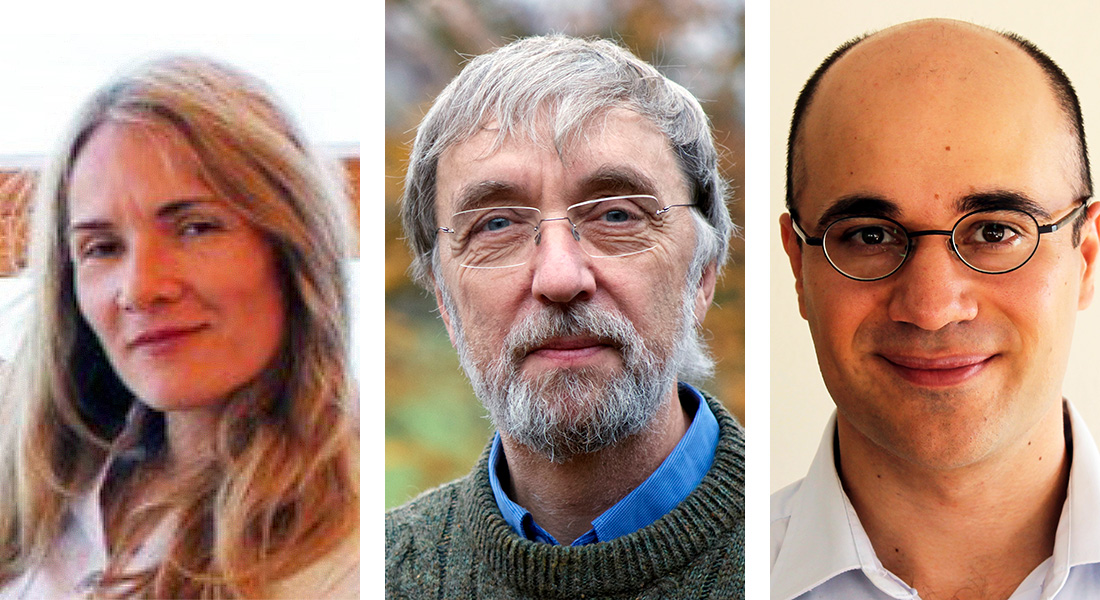Inaugural lectures by Musat, Plesner Jakobsen & Pazuki
Professors Magdalena Elena Musat, Hans Plesner Jakobsen and Fabien Pazuki will give inaugural lectures on Friday 17 June 2020 followed by a reception.

The Corona period made it necessary to postpone the three inaugural lectures from 2020 and 2021. The dean appointed Fabien Pazuki as a professor in August 2020, Hans Plesner Jakobsen as an adjunct professor in November 2020, and Magdalena Musat was appointed professor in December 2020.
The lectures take place in HC Ørsted Institute's auditorium 4, while the reception takes place in front of auditorium 1.
Program:
13:00 - 13:10 Welcome by Michael Sørensen
13:10 - 13:50 Lecture by Magdalena Musat
Operator algebras meet Alice and Bob
- Infinite dimensional phenomena in the Analysis of
Quantum Information Theory
14:00 - 14:40 Lecture by Hans Plesner Jakobsen
Creation Operators and Quantized Differential Operators
14:50 - 15:30 Lecture by Fabien Pazuki
Arithmetic of abelian varieties
15:30 - 16:30 Reception - in front of AUD 1
Operator algebras meet Alice and Bob
- Infinite dimensional phenomena in the Analysis of Quantum Information Theory
Lecture by Professor Magdalena Elena Musat
The abstract will follow.
Magdalena Musat obtained her PhD at the University of Illinois at Urbana-Champaign in 2002 with Don Burkholder and Marius Junge as supervisors. After temporary positions at UC San Diego and the University of Memphis, she became an associate professor at the University of Southern Denmark in 2008 and the following year at the University of Copenhagen.
Magdalena Musat is an expert in functional analytical aspects of operator algebras. She has made important contributions to completely limited and completely positive mappings, non-commutative Lp spaces and martingales, and applications of operator algebra in quantum information theory. She is a clear, ambitious and organized teacher – as well as Head of Studies of the Master's program in mathematics.
Read more about Professor Magdalena Musat
Creation Operators and Quantized Differential Operators
Lecture by Adjunct Professor Hans Plesner Jakobsen
Abstract: In the age long tradition of such talks, we will begin by commenting on a few items from our CV. Then we turn to the math part which will be an excursion that begins with the canonical commutation relations i.e. the Heisenberg algebra $ {\ mathfrak h} _k $ in $ k $ variables. We construct quadratic expressions in the generators of $ {\ mathfrak h} _ {2n} $ that satisfy the Serre relations of $ su (n, n) $. From tensor products of the unique irreducible unitary representation of $ {\ mathfrak h} _ {2n} $ we then construct all unitary highest weight modules of $ su (n, n) $. These representations will for small $ k $ be missing some $ {\ mathfrak k} $ types, e.g. corresponding to all $ (k + 1) \ times (k + 1) $ minors. This means that there are homomorphisms between generalized Verma modules which in turn, by duality, leads to covariant differential operators. In the case of quantum groups, there is a similar picture. Here one begins with the Hayashi-Weyl algebra $ {\ mathcal H} {\ mathcal W} _ {2n} $.
Hans Plesner Jakobsen obtained his PhD degree at MIT in 1976 with Irving E. Segal as supervisor. After three years as an Assistant Professor at Brandeis University, he returned to Denmark and held research positions at the University of Copenhagen. UCPH then employed him as Associate Professor in 1984, a position he held until his retirement in 2019. He was awarded the doctoral degree at UCPH in 1989. In the period 1999-2006, he was Head of the Mathematics Section under the Department of Mathematical Sciences.
Hans Plesner Jakobsen is an expert in the representation theory of (super-)Lie groups and algebras and in quantized function algebras with strong connections to various branches of mathematical physics.
Read more about Adjunct Professor Hans Plesner Jakobsen.
Arithmetic of abelian varieties
Lecture by Professor Fabien Pazuki
Abstract: Abelian varieties are objects at the crossroads between geometry, analysis, algebra and number theory. They constitute one of the key ingredients in the proof of Fermat’s Last Theorem by Wiles and in the proof of the Mordell Conjecture by Faltings. Famous open conjectures - for example, the Birch and Swinnerton-Dyer conjecture - focus on these special varieties. Studying compact Riemann surfaces, lattice theory and periodic functions, rational points and diophantine problems, projective and affine geometry of curves, schemes, higher Galois theory, modular forms and L-functions, local fields, global fields, finite fields, modern cryptography, each time these varieties turn out to be crucial. I will present several of my results concerned with arithmetic properties of abelian varieties, hoping the audience will get a feeling of how one can spend so much time with these marvellous objects!
Fabien Pazuki obtained his PhD in 2008 from the University of Bordeaux under the joint supervision of Professor Henri Cohen (Bordeaux 1) and Professor Marc Hindry (Paris 7). He then became an assistant professor at Paris 7 and after a short postdoc at the University of Lethbridge, Canada; he obtained the position of associate professor (Maître de conférences) at the University of Bordeaux in 2009. He joined the Department of Mathematical Sciences, University of Copenhagen, in 2014. He obtained his "Habilitation à Diriger des Recherches" in 2017 at the University of Bordeaux.
Fabien works in the general field of diophantine geometry and contributes to the local number theory group in the form of organizing conferences and talks for the number theory seminar. Fabien is a highly regarded and popular teacher who is also functioning as Head of studies for the bachelor curriculum.
